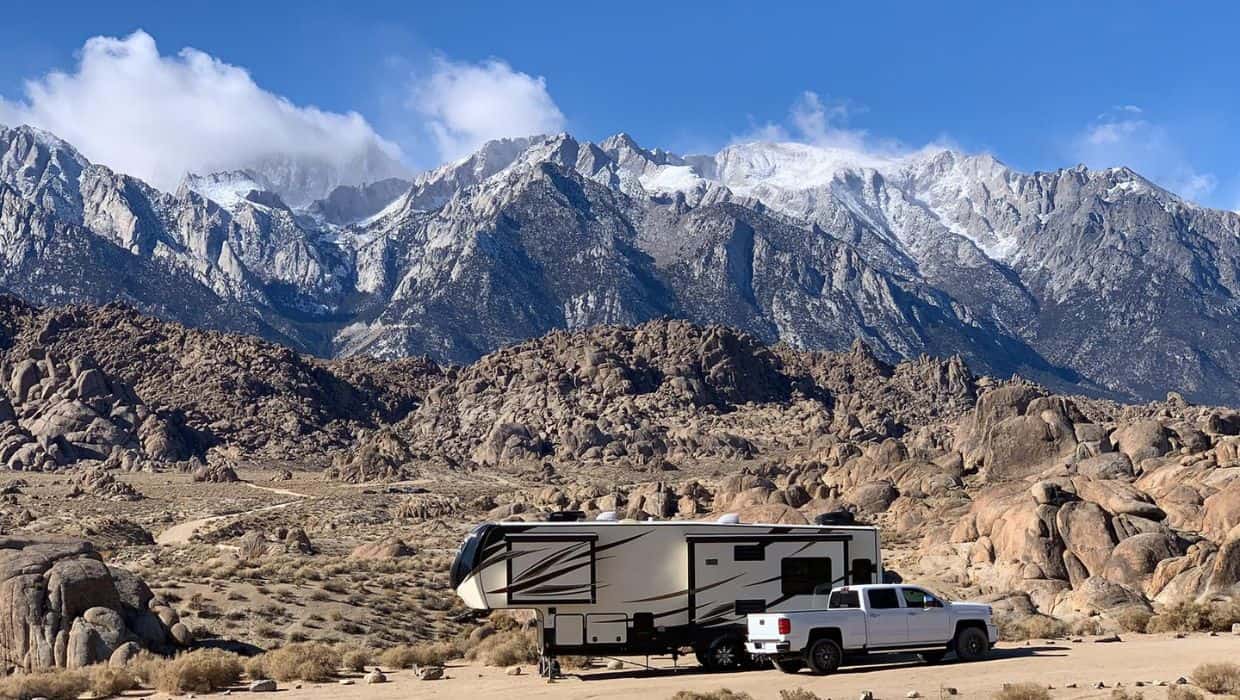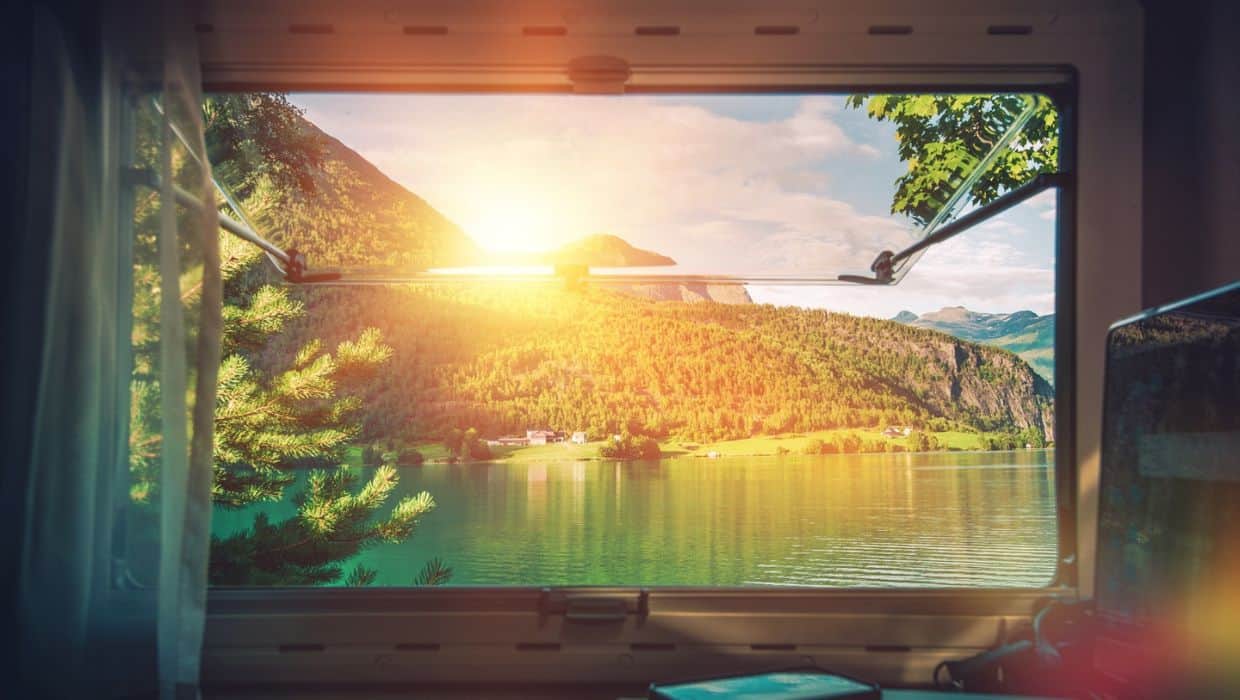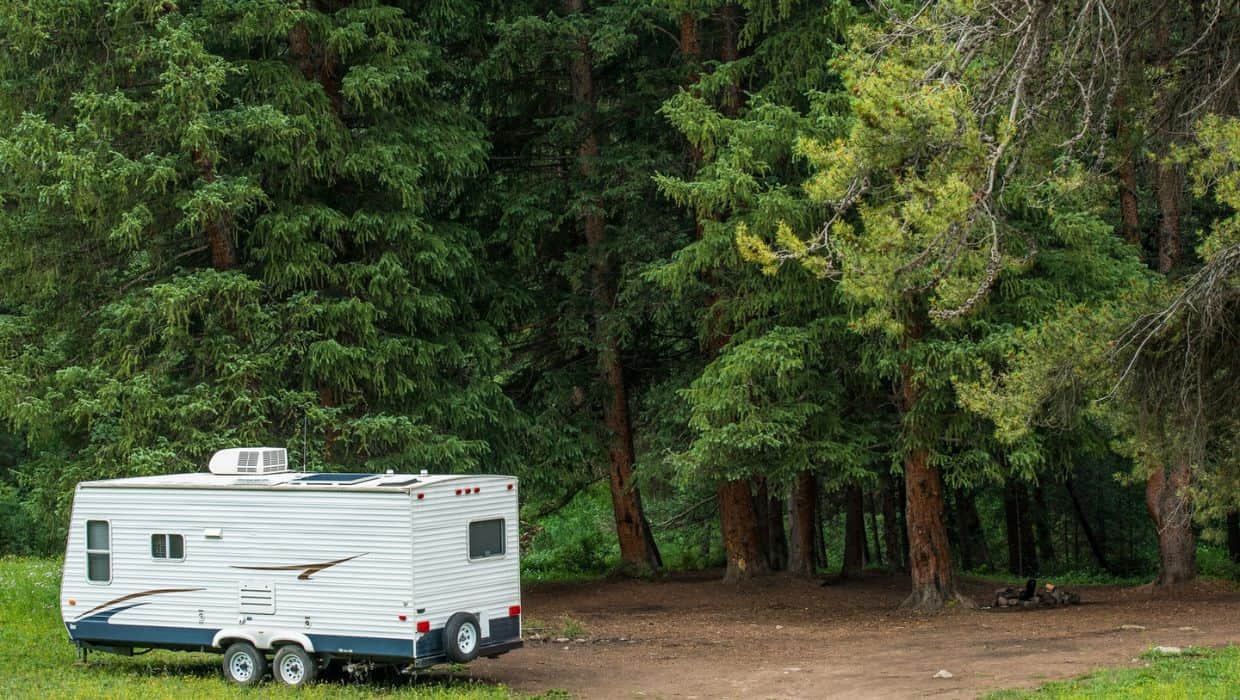Are you ready to break free from the confines of traditional campgrounds and embark on a thrilling adventure into the heart of nature? If the call of the open road and the untamed wilderness stirs your soul, then boondocking might be your gateway to an extraordinary RV lifestyle.

This post may contain affiliate link(s). As an Amazon Associate, I earn from qualifying purchases. See Disclosures.
What is boondocking?
Amidst the growing RV community, an adventurous offshoot has emerged: boondocking. You might be wondering, “What exactly is boondocking?”
Boondocking is often referred to as dry camping or wild camping. It is an unconventional style of RV living where adventurers ditch traditional campgrounds and RV parks to embark on off-grid journeys.
Imagine parking your RV amid a pristine, untouched wilderness enveloped in nature’s breathtaking beauty. Boondocking takes you far from traditional campgrounds to remote and secluded spots, immersing you in the wild wonders of nature.
This unique form of RVing allows you to camp without being confined to a campground with fellow campers within feet of your RV. Sometimes you will see RVers do caravans with other fellow RVers, and there are even events and meet-ups where everyone is boondocking. But in my experience, those who are boondocking are traveling by themselves and want to be left alone.
Some campers who are not ready to go one to two weeks of boondocking often get their feet wet with overnight boondocking.
Unlike typical RV camping experiences, boondocking enthusiasts forgo the luxury of full hookups and resort-like amenities. Instead, they rely on their RV’s onboard systems and alternative energy sources to sustain themselves during their stay.
Key characteristics of boondocking
- Self-sufficiency: Without the convenience of traditional hookups, boondockers must manage their limited resources efficiently. This includes conserving freshwater, managing wastewater responsibly, and making the most of available electricity through solar panels or generators.
- Embracing nature’s solitude: Boondockers relish in the peacefulness and solitude of remote locations, where they can revel in the breathtaking scenery without distraction.
- Leave no trace philosophy: Boondockers adhere to the leave no trace principles, ensuring their presence does not harm the environment, wildlife or other fellow travelers. Make sure to pack away everything after breaking down your camping kitchen and put away all of your Blackstone accessories so they don’t get lost.

Advantages of boondocking
Boondocking has several advantages over parking at traditional campgrounds, and free camping is only one of them.
Connection with nature and freedom to explore remote areas
One of the most significant advantages of boondocking is the unparalleled connection with nature that it offers. Traditional campgrounds often place RVers in crowded spaces, limiting the scope of natural exploration. Boondocking, on the other hand, opens the door to a world of raw, untamed beauty.
Picture waking up to the soothing sounds of birdsong, the gentle rustling of leaves and the breathtaking views of mountains, deserts, or forests stretching as far as the eye can see. If you’re close by, you should check out some of these national parks.
Boondockers can choose their own secluded spots away from the beaten path and surrounded by untouched wilderness. Whether it’s a hidden lakeside oasis, a pristine desert landscape or a remote forest glade, these off-grid locations provide a sense of adventure and serenity that cannot be replicated in crowded campgrounds. Wake up in the tranquil mornings with a hot cup of coffee, then make your favorite Blackstone Griddle recipes with show-stopping views and no neighbors in site.
Cost savings and financial benefits compared to traditional campgrounds
In an era where travel expenses are a growing concern, boondocking is a welcome breath of fresh air. As adventurous souls seek alternatives to expensive accommodations, boondocking emerges as a cost-effective option that fits various budgets.
Traditional campgrounds often are $30-$150 per night or more if you’re at a fancy resort or somewhere like the Florida Keys. While they provide amenities like hookups and facilities, these luxuries come at a price.
In contrast, boondocking is generally free, making it an attractive choice for budget-conscious travelers. By relying on their RV’s self-contained systems and alternative energy sources like solar panels, boondockers can minimize expenses while enjoying a comfortable and fulfilling experience. Just note: you will have the upfront expenses of purchasing solar, batteries and/or a generator.
The financial benefits of boondocking extend beyond just the cost of camping. With the option to explore more remote areas, travelers can reduce fuel expenses by avoiding long drives to popular tourist destinations. Moreover, the opportunity to enjoy nature’s entertainment without spending a dime on amusement parks or attractions adds to the overall cost savings of boondocking.
Escaping crowds and finding solitude
Modern life often feels like a non-stop whirlwind, with bustling cities, crowded tourist destinations and a constant influx of information. Boondocking allows RVers to escape this hectic pace, providing a much-needed refuge from the noise and commotion of urban life. If you’re camping near Antelope Canyon, there should be plenty of land within a short driving distance. Typically out West has way more BLM land than on the East Coast.
Flexibility and spontaneity in travel plans
One of the liberating aspects of boondocking is the unparalleled flexibility and spontaneity it offers in travel plans. Unlike the rigid itineraries often associated with traditional vacations, boondocking allows RVers to embrace a go-with-the-flow mentality, making each day an adventure filled with endless possibilities.
With no reservations to tie you down, you can change course at a moment’s notice. Discover a hidden gem on your way to a planned destination? No problem, pull over and set up camp for the night.
Essential boondocking gear and preparations
To ensure your boondocking experience is a safe and enjoyable one, your rig must include a few things, like a power source, fresh water and somewhere to store dirty water until it can be disposed of. You’ll want other things, but these are the main must-haves.
Power sources
When venturing off-grid, having a reliable power source becomes paramount. Solar panels are a game-changer for boondockers. These panels not only provide an eco-friendly power solution to recharge your batteries but also ensure you have electricity even in remote locations. If you don’t want to drill holes into your roof to mount solar panels, you can get a solar generator and portable solar panels to power your rig, as I have for my Forest River Cedar Creek Hathaway 38RTH.
Alongside solar panels, having an alternative power source to recharge your batteries, such as a gas or propane generator, can serve as a backup plan on cloudy days or in shaded areas.
Freshwater and waste management solutions
Managing freshwater and wastewater is a fundamental aspect of boondocking. Without the convenience of continuous hookups, boondockers must be mindful of their water usage and waste disposal.
To extend your freshwater supply, consider investing in portable water tanks to transport and store extra water. Equally important is an efficient wastewater management system. Many boondockers use portable RV dump tanks to collect grey and black water, ensuring responsible waste disposal when leaving their remote campsite.

Finding boondocking locations
One of the primary appeals of boondocking is the access it provides to vast public lands managed by the Bureau of Land Management (BLM), national forests, and other government agencies. These tracts of land offer a treasure trove of boondocking opportunities, allowing RVers to stay for free or at a minimal cost.
BLM lands, in particular, are renowned for their extensive network of dispersed camping sites. These sites often lack amenities but grant boondockers the chance to experience the beauty of unspoiled landscapes. National forests also offer dispersed camping, with specific guidelines and designated areas to ensure responsible enjoyment of these pristine locations.
Boondockers Welcome and Harvest Hosts are websites that connect you with people and businesses that will allow you to park on their property for free. Oftentimes they will even have electricity hookups that you can use for a fee. If you’re staying at a business, it’s most appreciated if you make a purchase to promote the small business.
Challenges of boondocking
Boondocking is not without its challenges. It’s essential to be prepared for the obstacles that may arise during off-grid living.
- Monitor resource usage: Keep track of daily water and electricity consumption. Understanding your usage patterns will help you conserve resources effectively.
- Practice water-saving habits: Embrace water-saving habits, such as taking short showers and using dishes efficiently.
- Utilize solar power wisely: Make the most of solar energy during daylight hours. Charge devices, run appliances and recharge batteries when the sun shines to reduce reliance on other power sources.
- Pack smartly: Prioritize essential items and pack efficiently to avoid unnecessary clutter and weight, which can strain your RV’s capacity.
“My husband and I live in an RV full time. We do a lot of boondocking and it’s one of our favorite things! We do our best to boondock in popular areas during off-season times. For example, we spent 7 weeks in January and February of this year boondocking on Crystal Beach in Texas. The mild weather made it easy to manage our energy needs and the beach was gloriously uncrowded. Finally, a tip for cooking with limited water: Before you head out for a boondocking trip, freeze foods in zipper-top bags. Reheat the food, still in the zipper-top bag, in a pot of boiling water, then reuse the water to wash dishes.”
— Rebecca Blackwell, A Little and a Lot
Ultimately, boondocking is not just a way of RV living; it’s a philosophy that encourages us to reconnect with nature, cherish the simplicity of life and find joy in the journey itself. Say goodbye to the busy city life and hello to the peaceful serenity of nature. Enjoy your boondocking adventure and have a fantastic time exploring the great outdoors. Happy travels, fellow adventurers.
Lara is a Registered Dietitian Nutritionist and Personal Trainer. She is also a photographer and recipe developer and has a food and travel blog LaraClevenger.com. She shares easy recipes that are mostly low carb, along with some bowling and travel adventures. Whether you’re cooking with an air fryer, Blackstone or Instant Pot, she has you covered with healthy recipes.